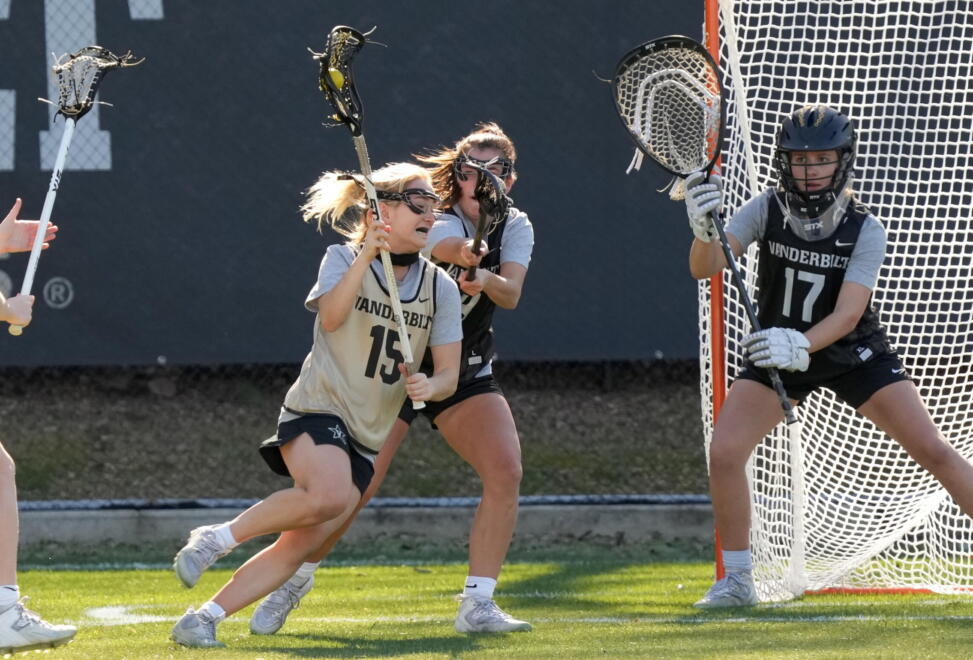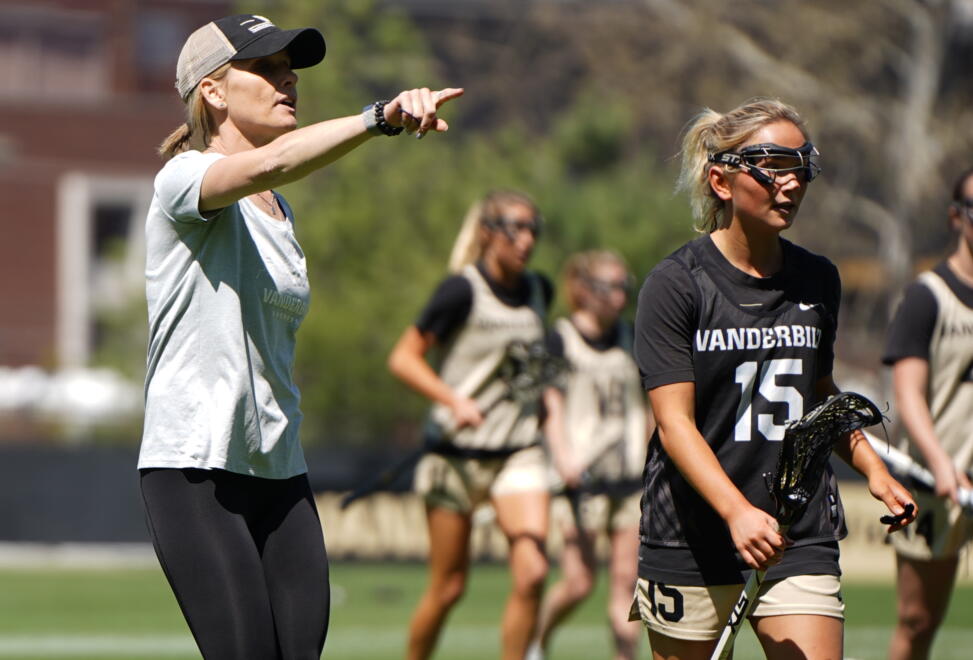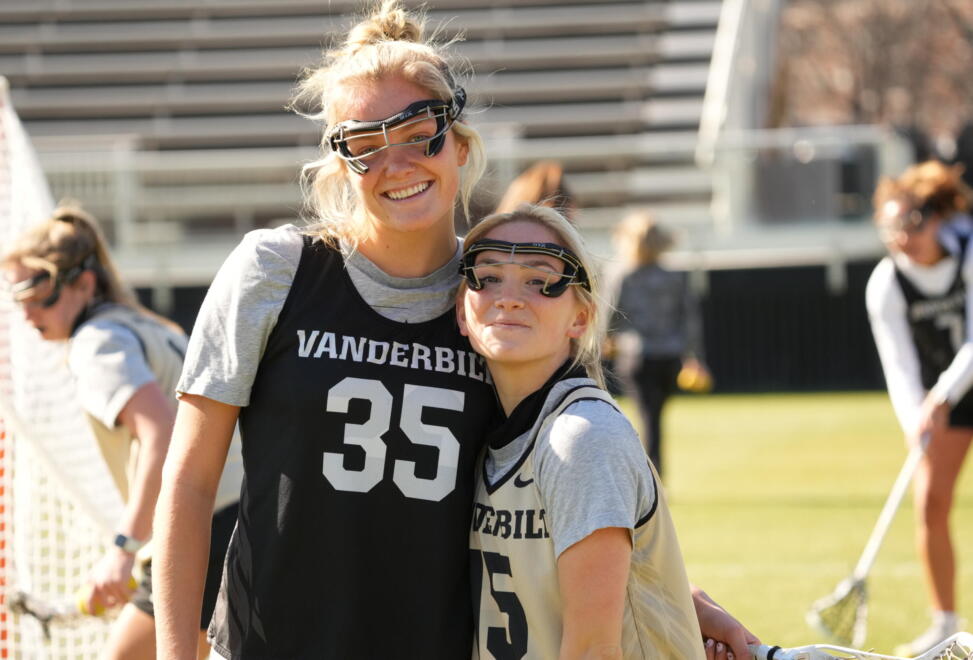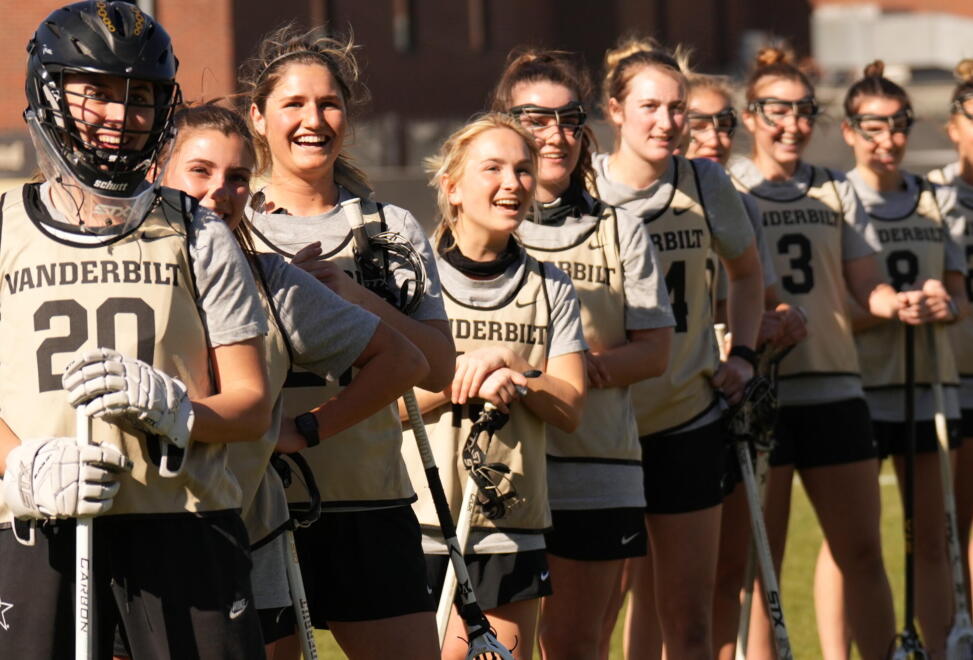The Path Forward
by Graham HaysAfter rediscovering her love for lacrosse, Cailin Bracken has a mental health message to share with collegiate athletics.
Cailin Bracken walked away from lacrosse a little more than a year ago—walking away from a sport that had shaped her world for almost as long as she could walk at all.
It wasn’t winning that brought her back, although she’s done plenty of that in her young athletic life. Nor was it some insatiable need to be the best.
She returned because of the feeling that comes with making those around her better. She came back because those people make her better—at threading a pass between defenders, sure. But more than that, they make her better prepared to take on all of life’s challenges. And everything else that it offers.
Anxiety, doubt, injuries and the COVID-19 pandemic stripped lacrosse of its joy and left every day a challenge that Bracken, looking at the world through the lens of an athlete, felt ill-equipped to meet. Walking away was her first step toward discovering an identity beyond lacrosse—and toward ultimately rediscovering her love of the game and the joy in being a teammate. It is a journey she knows too many of her peers never complete.
Earlier this year, Bracken wrote an open letter about the state of mental health in collegiate athletics. Shaken, along with the rest of the athletic community, by the suicides of Katie Meyer, Morgan Rodgers and too many more peers, she wrote about fear and wondering how close she came to the edge of that precipice. She implored those involved at all levels of athletics to think about the people and lives behind the statistics and scores.
As a new academic year begins for student-athletes at Vanderbilt and around the country, bringing with it new opportunities and new pressures, Bracken’s letter is a courageous request for change. What led her to write the letter is also a blueprint for how, even before the arrival of systemic, societal change that takes root only over years, people can take better care of each other. When she struggled, she spoke. When she spoke, her coach listened. That’s a start.
“Ultimately, the reason that I stepped away was for my mental health,” Bracken said. “And the reason that I came back was because I loved the sport and the people, and I wanted to be a part of the Vanderbilt women’s lacrosse team. It has truly made my life so rich with connection and love. It’s taught me, more than anything else in my life, about teamwork and dedication.
“Coming back served my mental health, as did stepping away. Both things can be true. Stepping away from lacrosse can help my mental health, and leaning into lacrosse can help my mental health. It depends on where I am in that moment.”

"I needed to figure out who I was without lacrosse, and develop a sense of self — a sense of worth — outside of the sport, so that I was no longer depending on my coaches or my parents or the stat sheets to tell me I mattered."
Cailin Bracken, from "A Letter to College Sports"
An athlete’s identity
Lacrosse enveloped Bracken growing up in Ridgewood, New Jersey. Her hometown boasts an annual festival dedicated to the game, complete with a parade, youth clinics and matches featuring one or both of the high school’s perennially successful varsity teams.
But Bracken didn’t need festivals, opponents or accolades for fuel. She didn’t even need a field. To find the Ridgewood landmark that is the monument to her lacrosse story, make your way to the family’s home. A stick, a ball and the exterior wall were all she needed—alone, but not without a rival. Bracken spent hours playing “wall ball,” a familiar lacrosse ritual. One day, the goal might be to complete 50 passes in a row, aiming each time for the same small spot on the wall. The next day, 100 passes. If she dropped the 99th, she started again.
Some athletes thrive through projected competition. Trash talk, perceived slights, bulletin board material—all are tools that serve to create a foe to compete against. For Bracken, competitiveness was an introspective exercise. Winning wasn’t enough. She craved personal excellence. The more she attained on the lacrosse field, the more single-minded her focus became.
“I would validate my lack of academic interest by telling myself I was good at lacrosse,” Bracken said. “And every time I had a shortcoming in some other area of life, the validation came from being a good lacrosse player.”
The limits of lacrosse
Still, as her world expanded, it grew ever more difficult to rely on lacrosse for her identity. By the time Bracken arrived at Vanderbilt in the summer of 2020, she felt her mental health worsening, exacerbated by an eating disorder diagnosed the previous year. Almost immediately upon arrival in Nashville, she tested positive for COVID-19 and entered quarantine. Except for a similarly afflicted teammate she scarcely knew, she was alone in her new surroundings.
Before and after a teamwide outbreak, Hewitt and her staff reiterated that, like all Vanderbilt student-athletes, members of the lacrosse team could opt out of athletic participation for the fall semester with the school and staff’s full support and no penalty. Once cleared to leave quarantine, and with her coach’s support, Bracken elected to return home.
“I had already been struggling so much over the summer,” Bracken said. “And upon hearing that, it was the assurance I needed to take that time in the fall.”
She returned to Vanderbilt before the second semester. She wanted to complete the return-to-play protocol in place for student-athletes who tested positive in time for the new semester. After months of video meetings and text messages from afar, she also sought to catch up on the relationship building with teammates. Yet with COVID vaccines months away from widespread availability, she returned to an environment where necessary health and safety protocols still made normal routines difficult to establish. Stress and anxiety eroded her peace of mind in still-unfamiliar surroundings.
Amid all of this, she struggled on the field and played sparingly through the first month of the 2021 regular season. Even as the team around her continued to grow, ultimately reaching the NCAA tournament, Bracken’s confidence continued to crumble. The sport that had once provided validation no longer offered even pleasure, let alone an identity.
“When that was taken away, and I didn’t feel like I was a good lacrosse player—that I was pretty average for the Division I landscape—the narrative that I had of myself stopped serving me in any way,” Bracken recalled. “I was afraid of failing myself, and I was afraid of failing the people who loved me and always celebrated my lacrosse success.”

"If you take care of the whole person, you work to develop the whole person and you work to live every day enjoying what you do, you’re going to have a by-product of success."
Beth Hewitt, Vanderbilt lacrosse head coach
A coach ready to listen
The final straw was a concussion sustained as the final month of the regular season neared. The idea that lacrosse, already taxing her mental health, might now physically harm her brain overwhelmed her. She and Hewitt had maintained an open dialogue throughout her return home in the fall and through the early part of the spring semester, but now Bracken felt that there were no answers to find inside the sport. She wanted to escape. Fortunately, she felt comfortable turning to Hewitt and other coaches with those feelings and her decision.
“I like to think that your life is measured by the difficult conversations you’re willing to engage in, and my coaches were always so open and honest with me,” Bracken said. “Never once did I feel like they were hiding how they felt. Even if it wasn’t what I wanted to hear, they never held back from telling me where they were at. At the end of the day, they’re human beings too.”
Looking back at her own playing days as an All-American at North Carolina nearly two decades ago, Hewitt recalled teammates and peers in the sport who struggled with depression or anxiety. These aren’t new issues, especially among elite athletes, for whom the internal and external pressure to succeed has long been ubiquitous and unforgiving.
“Everything was about pushing each other harder and who could have the most horrific workout,” Hewitt recalled of athletic culture in her playing days. “Everything was about how much could you beat up your student-athletes to see what they could withstand. As a whole, I think we’re moving away from that, in a good way.”
Indeed, what has changed in recent years is the volume of the conversation, from whispers cloaked in guilt or shame to forthright dialogue. As more and more athletes speak publicly about various aspects of mental health, from NBA standout Kevin Love and tennis star Naomi Osaka to collegians like Bracken, the stigma placed on the topic in past generations dissipates. For Hewitt, who has two young children, the societal shift manifests in her approach. She coaches not as she was coached, but as she would want her children coached.
“I look at myself as a tool to get our student-athletes to the person or the professional who can help them work through their struggles,” Hewitt said. “That’s all I want to do is be a family member, a friend, a mentor for them when they come in with issues surrounding mental health. I want to help them get to the right place.
“If you take care of the whole person, you work to develop the whole person and you work to live every day enjoying what you do, you’re going to have a byproduct of success.”

"My relationship with lacrosse now is much more about my teammates. I want success for people around me, for my coaches and teammates. I’m playing for the people I love."
Cailin Bracken (pictured with teammate Nancy Halleron)
A journey back to the field
When Bracken met with Hewitt in April 2021 to tell her she was leaving the team, it wasn’t clear if she would ever return to the field. It also wasn’t anyone’s primary concern. Hewitt and assistant coaches Rob Bray and Jill Doherty made clear even then that no one in Nashville was turning their back on her. If not on the team, she would remain part of it.
“I would still be close to the team and involved because it’s my group of best friends,” Bracken said. “Vanderbilt lacrosse is not a community that just lets people go. Once you’re in, you’re in.”
In the days that followed, as the semester ended and she returned to New Jersey while the team competed in the postseason, Bracken, her parents and the Vanderbilt coaches remained in regular contact. Bracken and Hewitt even met over Zoom the morning that Vanderbilt played Jacksonville in the NCAA tournament, mostly just to check in.
“We just had to keep talking,” Hewitt said. “I don’t know that there were a ton of specific things said on either end that made it work; it was just straight up being vulnerable and working through the hard together.”
By early summer, one persistent question lodged in Bracken’s mind. Would making her lacrosse hiatus permanent be a necessary sacrifice to safeguard her mental health? Or was it a concession to a fear of failure? Finally, with space and time to reflect after a year marked by change, pandemic, injuries and an eating disorder, she found an answer that fit her circumstances.
“I was afraid that I would give so much of myself to lacrosse and still fail,” Bracken said. “That was a barrier I had to overcome. You have to be OK with putting so much of your energy into this sport—and whatever the results that yields, you have to be OK with it. You’re not doing it for the results. You’re doing it for the connections you’re making on and off the field.”
She didn’t regret stepping away. On the contrary, it was a necessary part of the process of finding both the question and answer. But she also didn’t want to stay away. She wanted to play lacrosse again, even while she understood that the coaches who had only weeks earlier listened to her talk about losing her love for the game would be skeptical of the about-face.
She continued working with a therapist in New Jersey. She incorporated a healthier lifestyle, adjusting everything from diet to sleep to social patterns. Meditation proved a useful tool, too, as did the mere act of spending time alone, reading or listening to podcasts about growth.
In addition to the resources available at Vanderbilt, including a sports medicine staff that Bracken credited with helping connect her with dieticians to aid her recovery from the eating disorder, Hewitt arranged meetings with Ricki Walker. An acquaintance of the coach, former collegiate student-athlete and now sport and performance psychologist who works with U.S. Ski and Snowboard, Walker has worked with Vanderbilt lacrosse in team settings and also spent time working one on one with Bracken. Sometimes they spoke about sports performance, at other times simply about managing life and, as Bracken put it, general wisdom.
A storybook version might have Bracken storming back on the field in the 2022 season and emerging a star. In reality, in addition to shaking off the rust of essentially two years away from elite competition, she battled more injuries that limited her to five appearances. Yet that makes it all the more powerful that she finished the season as full of joy as she began her return.
“Going into the year, I wasn’t naïve. I knew it would be challenging,” Bracken said. “And there were days that were really challenging, but those instances made me feel strong and more assured. It was kind of like someone who is injured and maybe takes a hit and realizes they are OK and can trust their body again. I knew that I could trust my mind, and that I had made real, actionable, sustainable changes in the way that I think and the way that I see the world.”

A blueprint for others
Neither Bracken nor Hewitt purport to have the answers for the mental health crisis that continues to unfold in collegiate and youth athletics. But their collaboration serves as an example of a process that delivered a positive outcome. Bracken felt lost at times, but she never felt alone or unable to approach someone willing to listen.
“If our student-athletes are struggling with mental health, it might be lacrosse, but it might be family things or relationships,” Hewitt said. “We have a lot more work to do, specifically in Division I lacrosse, to really understand all sides of mental health.
“It’s always going to be a work in progress. Our team is working really hard at it and trying to be supportive, but … in college athletics, we’ve just lost too many young people.”
In her open letter, Bracken describes the “heart wrenching arc” that so many of those stories share and the unanswered question of how a person who inevitably meant so much to so many could feel so alone. She can’t answer for them. But as tens of thousands of student-athletes take the field anew this year, her words remain a call to action for those who have the power to create a better, healthier culture in collegiate athletics.
The response has been encouraging, ranging from an interview with Lara Spencer on “Good Morning America” this past spring to numerous podcasts and an invitation to speak to students at her former high school. In November, she will speak as part of a mental health symposium at the United States Olympic and Paralympics Museum in Colorado Springs, Colorado. Beyond large scale events and appearances, a growing social media community has provided one-on-one feedback from current and aspiring athletes inspired by her story.
She would still like to see organizations such as the NCAA take more definitive steps to address mental health. She is frequently frustrated that the pace of change can feel glacial. But in the meantime, her story remains a map for all those who feel lost.
“I think it is possible for other student-athletes to go through a similar process, if you navigate it with honesty,” Bracken said. “I am so lucky to have coaches who I could trust enough to tell that I was struggling. And coaches who listened and asked how we could work through it, together.”
